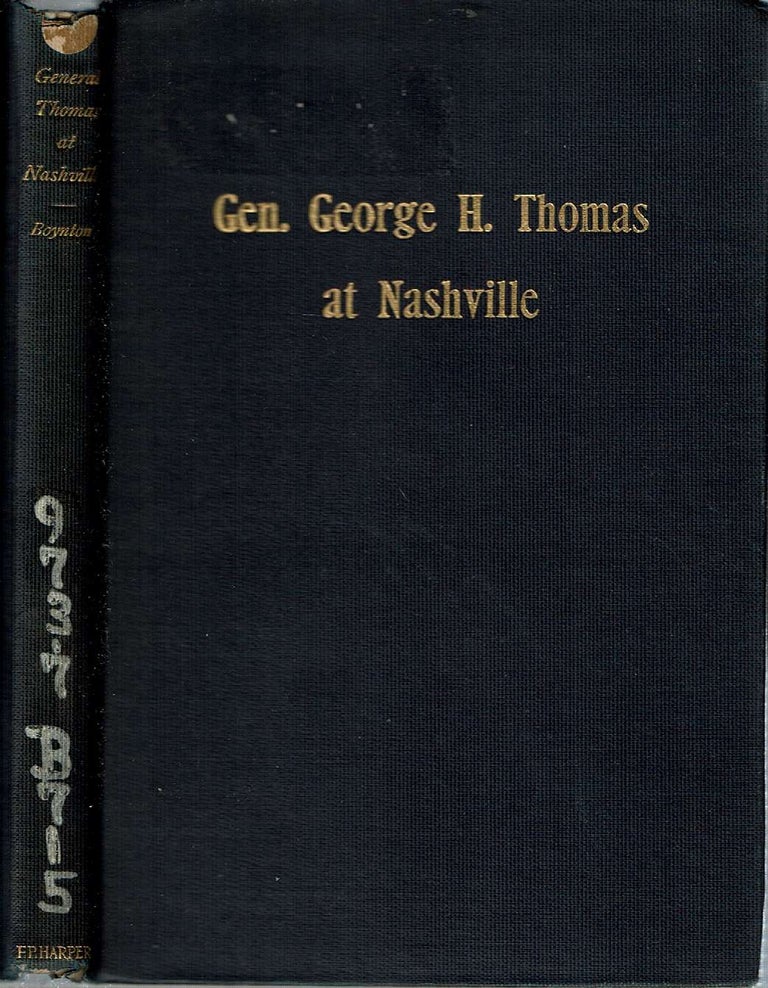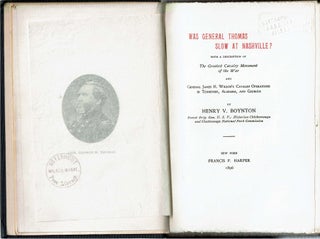Was General Thomas Slow At Nashville ? With a description of The Greatest Cavalry Movement of the War and General James H Wilson's Cavalry Operations in Tennessee, Alabama, and Georgia
New York: Francis P. Harper, 1896.
Illustrated by Portrait Frontispiece. Limited Edition. Hardcover. Good with no dust jacket. Item #13748
Library stamps/marks/labels/pocket, front hinge starting but holding, otherwise light wear. Solid hardcover.; Limited Edition, #94 of 450 copies. Henry Van Ness Boynton earned a Congressional Medal of Honor during the Battle of Missionary Ridge at Chattanooga, and helped lead the postwar creation of the Chickamauga and Chattanooga battlefields national park. Boynton had already written a book critiquing Sherman's generalship, and was a strong partisan of General Thomas. General George Henry Thomas, who had been Sherman's roommate at West Point, was a Virginian who stayed loyal to the Union (he was declared dead by his sisters who never reconciled with him). The successes Thomas had earned had also alienated him from Generals Grant and Sherman. Left with insufficient forces to take the offense out of Nashville, Thomas delayed attacking until his cavalry was fully equipped and prepared. "When General Thomas felt himself to be ready, or so nearly ready that he believed success attainable, he delivered the battle of Nashville. In his whole career he had never struck a blow till he felt himself ready. He looked upon the lives of his soldiers as a sacred truact, not to be carelessly imperiled. Whenever he moved to battle, it was certain that everything had been done that prudence, deliberation, thought, and cool judgment could do under surrounding circumstances to insure success commensurate with the cost of lives of men. And so it came to pass that when the war ended it could be truthfully written of Thomas alone that he never lost a movement or a battle." - pages 39-40. With the passage of time, and those personality and political disputes that filled the post-war period, Boynton's positive view of Thomas's methodical preparations at Nashville have become the modern consensus. "Almost a century later, historian Bruce Catton summed up the battle in two words: "Everything worked." Thomas "comes down in history...as the great defensive fighter, the man who could never be driven away but who was not much on the offensive. That may be a correct appraisal," wrote Catton, an admirer and biographer of Grant. "Yet it may also be worth making note that just twice in all the war was a major Confederate army driven away from a prepared position in complete rout—at Chattanooga and at Nashville. Each time the blow that finally routed it was launched by Thomas."" - Ernest B. Furgurson, "Catching Up With “Old Slow Trot” : Stubborn and deliberate, General George Henry Thomas was one of the Union’s most brilliant strategists. So why was he cheated by history?", Smithsonian Magazine, March 2007. C E Dornbusch; Military Bibliography of the Civil War; I OH-207A. Hard-to-find and well-reasoned Limited Edition on the crushing victory by George H Thomas and the Army of the Cumberland over John Bell Hood and the Army of Tennessee at the Battle of Nashville. ; Ex-Library; 95 pages.
Price: $149.95


